SqlBulkCopy 做为SQL Server 官方 批量入库类,性能不会太差。其事务部份官方说明较模糊,因此 针对事务配置做了一些测试。
A. 先准备测试场景 ,关于SqlBulkCopyOptions.KeepIdentity 应用。 新建两张表 , 每张表列a 做为自增列,同时做为主键 , 其中 test_sqlbulk 源表 ,先添加一组数据。
CREATE TABLE [dbo].[test_sqlbulk]( [a] [int] IDENTITY(1,1) NOT NULL, [b] [int] NULL, CONSTRAINT [PK_test_sqlbulk] PRIMARY KEY CLUSTERED ( [a] ASC )WITH (PAD_INDEX = OFF, STATISTICS_NORECOMPUTE = OFF, IGNORE_DUP_KEY = OFF, ALLOW_ROW_LOCKS = ON, ALLOW_PAGE_LOCKS = ON) ON [PRIMARY] ) ON [PRIMARY] CREATE TABLE [dbo].[test_sqlbulk_des]( [a] [int] IDENTITY(1,1) NOT NULL, [b] [int] NULL, CONSTRAINT [PK_test_sqlbulk_des] PRIMARY KEY CLUSTERED ( [a] ASC )WITH (PAD_INDEX = OFF, STATISTICS_NORECOMPUTE = OFF, IGNORE_DUP_KEY = OFF, ALLOW_ROW_LOCKS = ON, ALLOW_PAGE_LOCKS = ON) ON [PRIMARY] ) ON [PRIMARY]
添加数据:
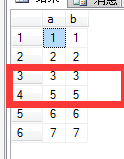
测试代码:

SqlConnection sqlConn = new SqlConnection( sourceConnection) ; sqlConn.Open() ; SqlCommand commandSourceData = new SqlCommand("select * from test_sqlbulk ", sqlConn); SqlDataReader reader = commandSourceData.ExecuteReader(); // Set up the bulk copy object using the KeepIdentity option. using (SqlBulkCopy bulkCopy = new SqlBulkCopy( sourceConnection)) { bulkCopy.BatchSize = 2; bulkCopy.DestinationTableName = "dbo.test_sqlbulk_des"; // Write from the source to the destination. // This should fail with a duplicate key error // after some of the batches have been copied. try { bulkCopy.WriteToServer(reader); } catch (Exception ex) { Console.WriteLine(ex.Message); } finally { reader.Close(); } }
再看看目标表 test_sqlbulk_des 结果 , 由于SqlBulkCopy 构造参数没有 KeepIdentity 标识,目标表自增列与源表不一致 :
test_sqlbulk_des 查询结果:
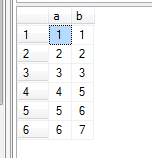
=>调整代码,增加 SqlBulkCopyOptions.KeepIdentity 选项,再次导入:
using (SqlBulkCopy bulkCopy = new SqlBulkCopy(
sourceConnection, SqlBulkCopyOptions.KeepIdentity))
{
bulkCopy.BatchSize = 2;
bulkCopy.DestinationTableName =
"dbo.test_sqlbulk_des";
// Write from the source to the destination.
// This should fail with a duplicate key error
// after some of the batches have been copied.
try
{
bulkCopy.WriteToServer(reader);
}
catch (Exception ex)
{
Console.WriteLine(ex.Message);
}
finally
{
reader.Close();
}
}
=>目标表,源表自增列一致了:

B. 测试无事务,内部事务(SqlBulkCopyOptions.UseInternalTransaction) , 外部传入事务 之间区别 , 以下所有测试均事先在目标表保留一行数据 使copy 过程中造成主键冲突,查看回退情况。
1. 无事务测试。初使化源表,目标表数据:
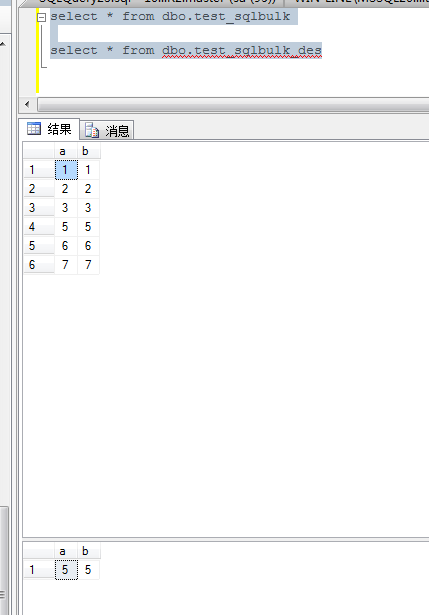
测试代码 , 不意外,如下代码最终会产生主键冲突错误, 执行结束后,再查询源表,目标表数据 。 BatchSize 设置为2 , 结果表明在第二批次主键冲突, 第一批次数据成功提交了(没有显示声明事务), 再将 BatchSize 设置为3 验证结果。
SqlConnection sqlConn = new SqlConnection( sourceConnection) ;
sqlConn.Open() ;
SqlCommand commandSourceData = new SqlCommand("select * from test_sqlbulk ", sqlConn);
SqlDataReader reader = commandSourceData.ExecuteReader();
// Set up the bulk copy object using the KeepIdentity option.
using (SqlBulkCopy bulkCopy = new SqlBulkCopy(
sourceConnection, SqlBulkCopyOptions.KeepIdentity))
{
bulkCopy.BatchSize = 2;
bulkCopy.DestinationTableName =
"dbo.test_sqlbulk_des";
// Write from the source to the destination.
// This should fail with a duplicate key error
// after some of the batches have been copied.
try
{
bulkCopy.WriteToServer(reader);
}
catch (Exception ex)
{
Console.WriteLine(ex.Message);
}
finally
{
reader.Close();
}
}
BatchSize = 2 结果:
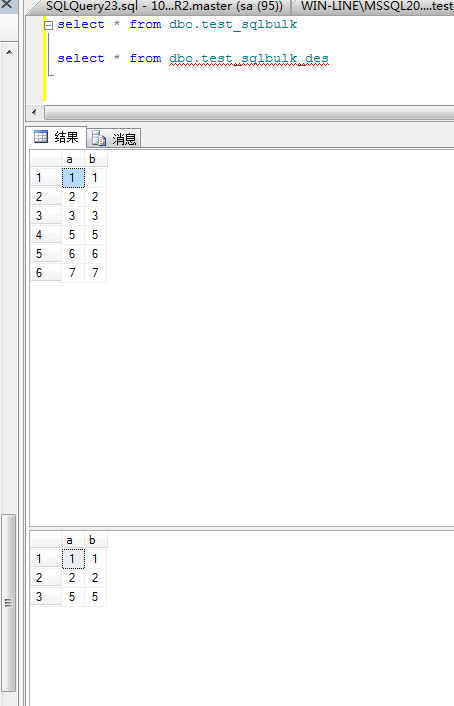
BatchSize = 3 结果:

2.指定内部事务 , 分别将 BatchSize 指定为 2 , 3, 4 。如下执行结果与上文示例 结果一致, 因此无论是否指定 SqlBulkCopyOptions.UseInternalTransaction 参数(不包括外部传入事务) ,SqlBulkCopy 内部按照一个批次一个事务。在出现异常时只回滚当前批次 , 在此之前成功执行批次不回滚。 因此若需全部回退,需将 BatchSize 设为 总记录条数 ,此时所有数据做为一个批次提交 , 异常回退批次,回退数据范围即全部数据。
测试代码:
// Set up the bulk copy object using the KeepIdentity option.
using (SqlBulkCopy bulkCopy = new SqlBulkCopy(
sourceConnection, SqlBulkCopyOptions.KeepIdentity | SqlBulkCopyOptions.UseInternalTransaction))
{
bulkCopy.BatchSize = 2;
bulkCopy.DestinationTableName =
"dbo.test_sqlbulk_des";
// Write from the source to the destination.
// This should fail with a duplicate key error
// after some of the batches have been copied.
try
{
bulkCopy.WriteToServer(reader);
}
catch (Exception ex)
{
Console.WriteLine(ex.Message);
}
finally
{
reader.Close();
}
}
=>BatchSize = 2 , 目标表结果:
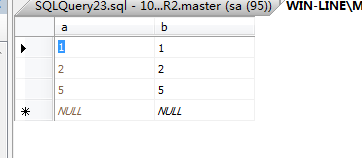
=>BatchSize = 3 , 目标表结果:

3. 外部传入事务对象场景 , 如果 使用SqlBulkCopy入库操作只做为本次业务处理一个子集,在整个业务处理环节中异常情况,需要回滚整个业务操作。 本次再新建一张表:test_sqlbulk_update , 测试过程中,先对该表增加一条记录,再重复之前异常场景。 结束时,之前新增记录也回退了。
因此, 当外部传入事务对象时,SqlBulkCopy 内部不提交事务, 在异常情况,有可能会自动回滚。

CREATE TABLE [dbo].[test_sqlbulk_update]( [a] [int] IDENTITY(1,1) NOT NULL, [b] [int] NULL, )
SqlConnection sqlConn = new SqlConnection( sourceConnection) ;
sqlConn.Open() ;
SqlTransaction tran = sqlConn.BeginTransaction();
SqlCommand commandInsert = new SqlCommand("insert into [test_sqlbulk_update]( b ) values (1) ", sqlConn, tran);
int result = commandInsert.ExecuteNonQuery();
SqlCommand commandSourceData = new SqlCommand("select * from test_sqlbulk ", sqlConn, tran);
SqlDataReader reader = commandSourceData.ExecuteReader();
// Set up the bulk copy object using the KeepIdentity option.
using (SqlBulkCopy bulkCopy = new SqlBulkCopy(sqlConn, SqlBulkCopyOptions.KeepIdentity, tran))
{
bulkCopy.BatchSize = 2;
bulkCopy.DestinationTableName =
"dbo.test_sqlbulk_des";
// Write from the source to the destination.
// This should fail with a duplicate key error
// after some of the batches have been copied.
try
{
bulkCopy.WriteToServer(reader);
reader.Close();
tran.Commit();
}
catch (Exception ex)
{
reader.Close();
tran.Rollback();
// tran.Commit(); 异常仍提交执行,同时注释上一行。
}
}
=> 异常时执行 rollback, 最终结果:没做任何修改.
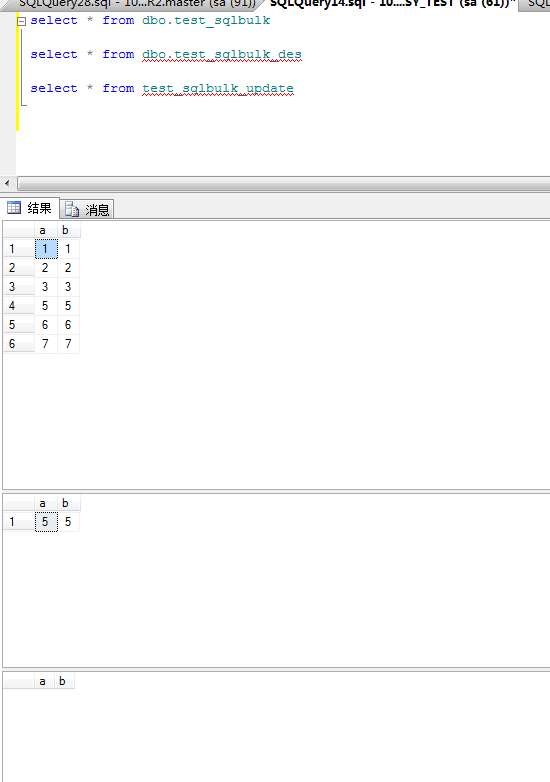
=> 外部事务,Catch 中执行 Commint ,发生异常,因为自动回滚了,但在Catch 执行 Rollback 无异常。

SqlTransaction tran = sqlConn.BeginTransaction(); SqlCommand commandSourceData = new SqlCommand("select * from test_sqlbulk ", new SqlConnection(sourceConnection)); SqlDataAdapter ada = new SqlDataAdapter(commandSourceData ) ; System.Data.DataSet ds = new System.Data.DataSet(); ada.Fill(ds); // Set up the bulk copy object using the KeepIdentity option. using (SqlBulkCopy bulkCopy = new SqlBulkCopy(sqlConn, SqlBulkCopyOptions.KeepIdentity, tran)) { bulkCopy.BatchSize = 2; bulkCopy.DestinationTableName = "dbo.test_sqlbulk_des"; // Write from the source to the destination. // This should fail with a duplicate key error // after some of the batches have been copied. try { bulkCopy.WriteToServer(ds.Tables[0]); SqlCommand commandInsert = new SqlCommand("insert into [test_sqlbulk_update]( b ) values ('a') ", sqlConn, tran); int result = commandInsert.ExecuteNonQuery(); tran.Commit(); } catch (Exception ex) { tran.Commit(); } }
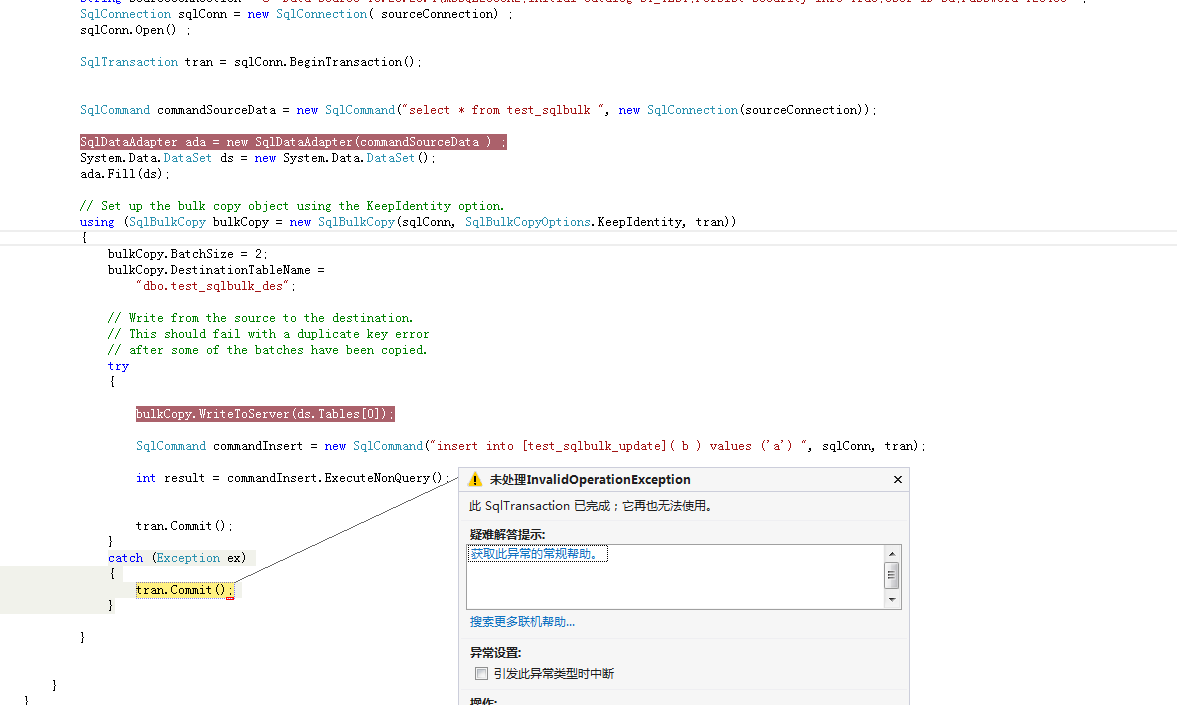



 posted on
posted on

 浙公网安备 33010602011771号
浙公网安备 33010602011771号